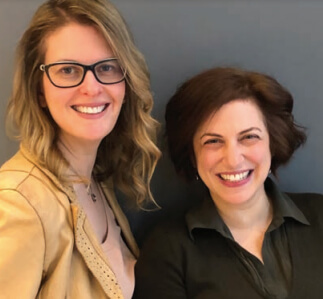Above: Tintype photograph by Will Wilson. Adam W. McKinney stands as Mr. Fred Rouse in front of the former Ku Klux Klan Klavern No. 101 Auditorium

Mira Sucharov & Chaya Halberstam
For our final issue as coeditors, we chose a theme that is close to both of our hearts and a frequent topic of our research: justice. Justice is often seen as the Jewish value par excellence—“justice, justice, you shall pursue!” Those who want to change the world, from the biblical prophets to contemporary Israel-Palestine activists, insistently call upon it. But, as the articles in this issue show, the word is often invoked as a vague ideal: it can encompass concepts such as retribution and punishment, wealth redistribution, and social equity; it can also refer to theological imaginaries in which justice is a key attribute of an omnipotent deity or a foundational concept of the afterlife. When we call for justice we tend to want to restore balance to a world that has tipped out of alignment. We imagine a paradise that brings forth enough resources and good will to beget universal concordance and contentment.
This issue features a variety of approaches to justice within Jewish Studies: social justice activism in North America and Israel-Palestine; questions of Jews and Judaism in the American court system, climate justice, reproductive justice, and religious freedom; the vision of justice in medieval judicial treatises; Jewish comedy and justice; Jewish approaches to the war in Ukraine; and accountability for war crimes.
The issue also features a robust section about justice and pedagogy—how concerns for equity in our classrooms and in society inform both what we teach and how we teach it. This section, which includes our roundtable on teaching social justice, covers a range of issues from decentering whiteness in Biblical Studies to teaching about reproductive justice and the Holocaust.
When we began our term as coeditors of AJS Perspectives we launched “The Patriarchy Issue,” which provided a forum to air and think through some of the most pressing problems in our profession—and for many of our research subjects. We then offered a mix of playful and somber thematic issues: hate, the body, travel, and protest. Two of our issues boasted themes more about form than content: the Unfinished Issue, and the Art Issue, which was steered by our talented guest editor, Samantha Baskind, who, soon after, completed her term as our wonderful inaugural art editor. In the process, we brought on a new art editor, Douglas Rosenberg, who is spotlighting new and provocative art across a range of contemporary media; a teaching with film and media editor, Olga Gershenson, who gathers ideas for thematic films and TV episodes that can be taught in Jewish Studies classrooms; and a new roundtable editor, Jason Schulman, who has begun to capture some of the serendipitous insights of conference roundtables which emerge only in dialogue with others. We now conclude our term with the Justice Issue: an acknowledgment that while few of the problems we began with in the Patriarchy Issue have been resolved, our diverse membership, with its shared expertise, creativity, and thoughtfulness, is itself a vision of a better future.
Chaya Halberstam
King’s University College
Mira Sucharov
Carleton University